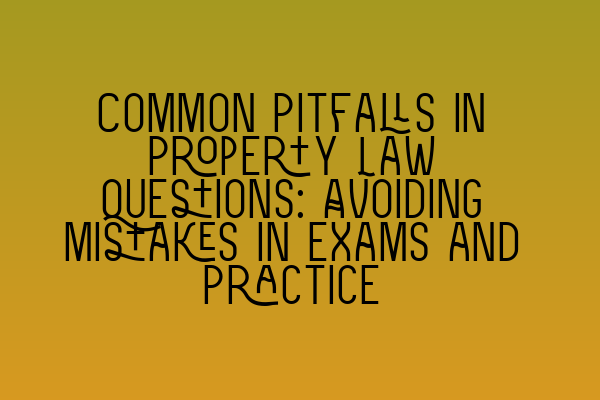Common Pitfalls in Property Law Questions: Avoiding Mistakes in Exams and Practice
Property law is a complex and ever-evolving area of law that requires a deep understanding of various legal principles and concepts. Whether you are studying for your property law exams or practicing property law in the real world, it’s crucial to be aware of the common pitfalls that can trip you up and lead to mistakes.
In this article, we will explore some of the most common pitfalls in property law questions and provide you with valuable tips to avoid these mistakes. By understanding these pitfalls and implementing the strategies discussed here, you can improve your chances of success in property law exams and enhance your practice in this field.
1. Lack of Knowledge on Updates in UK Property Laws
One of the significant challenges in property law is staying up to date with the latest changes and developments in UK property laws. Ignoring or not being aware of these updates can put you at a disadvantage, both in exams and in practice.
To ensure you are well-informed, it is crucial to keep track of any changes in legislation, case law, and relevant legal guidelines. Regularly reviewing credible sources such as the Updates in UK Property Laws: Key Changes and Implications article can provide you with valuable insights into recent developments in property law.
2. Failing to Understand Legal Challenges in Property Transactions
Property transactions can involve complex legal challenges that require a thorough understanding of the relevant laws and regulations. Failure to grasp these challenges can lead to incorrect advice or inadequate exam answers.
If you are struggling to navigate the intricacies of property transactions, our comprehensive guide on Legal challenges in property transactions: A comprehensive guide can provide you with an in-depth understanding of the common obstacles and how to overcome them.
3. Inadequate Knowledge of Lease Laws in the UK
Lease laws play a vital role in both residential and commercial property transactions. Failing to understand the intricacies and guidelines surrounding lease agreements can lead to critical errors and misunderstandings.
To ensure you have a strong grasp of lease laws in the UK, it is essential to familiarize yourself with the essential guidelines for tenants and landlords. Our guide on Navigating Lease Laws in the UK: Essential Guidelines for Tenants and Landlords offers valuable insights and practical tips to help you navigate lease-related questions with confidence.
4. Lack of Preparation for Property Law Questions
One of the most common pitfalls in exams is a lack of preparation. Property law is a vast subject, and attempting to cram all the relevant information at the last minute is an ineffective strategy.
To ace your property law exams, it’s essential to start early, review the syllabus, and create a structured study plan. Our article on Dominate Property Law Questions: Avoiding Common Pitfalls provides valuable tips and strategies to help you excel in your property law exams.
5. Ineffective Land Law Revision Techniques
Land law is an integral part of property law and can often be challenging to master. Many students struggle to develop effective revision techniques that allow them to retain and apply the necessary knowledge during exams.
If you’re looking for ways to improve your land law revision and excel in your exams, our article on Land Law Revision Tips: Ace Your Exam Preparation offers valuable insights and actionable methods to enhance your revision process.
Conclusion
Property law questions can be demanding, but by avoiding these common pitfalls and adopting effective strategies for preparing and answering these questions, you can set yourself up for success. Stay updated with the latest changes, understand the legal challenges in property transactions, familiarize yourself with lease laws, and invest time in thorough preparation and revision.
By implementing these tips and utilizing the resources provided in this article, you can navigate property law questions with confidence in both exams and practice.
